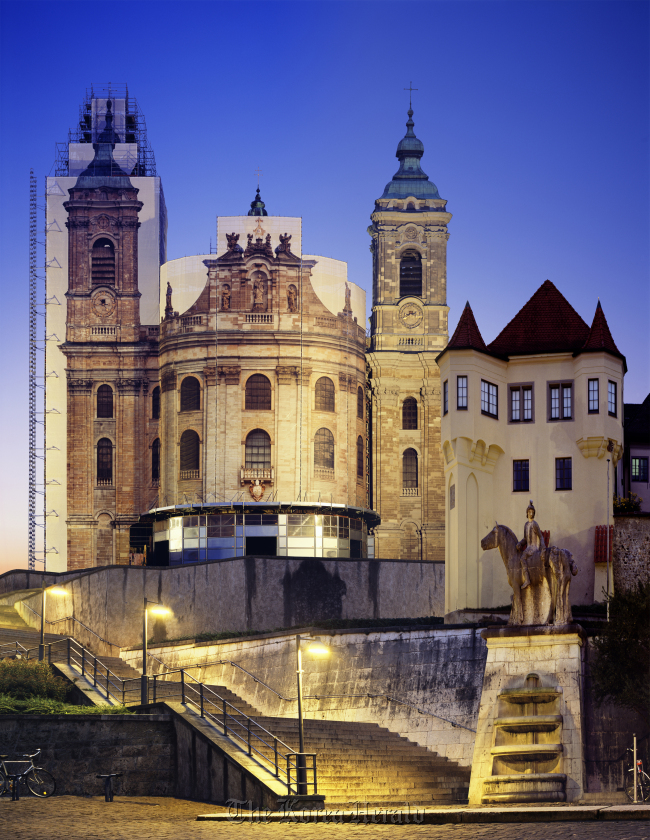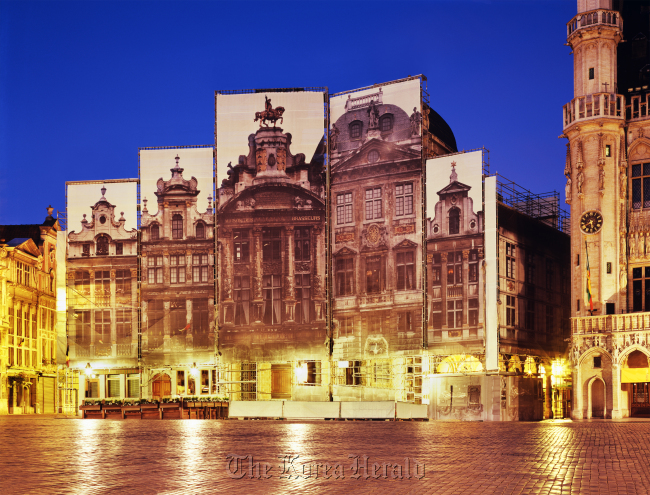 |
“Wine Garden; Holy Blood” (2012) by Han Sung-pil. (Arario Gallery) |
The question viewers ask in front of artist Han Sung-pil’s photographs and video works is simple ― is it real or fake?
In Han’s photographs, two different worlds coexist in one place, leaving viewers looking hard to distinguish which image is real, and which is manipulated.
An image of a bird and the blue sky that is actually painted on a huge water tank the artist found on Jeju Island blends well into the real natural landscape of Jeju.
His solo exhibition at Arario Gallery in Seoul presents around 20 pieces including photographs and video installations that constantly have viewers question whether what they are seeing is real.
The places in his photographs that look very fictional are in fact, very real.
“The real sky and the sky drawn on the wall caught my attention when I was driving to Seogwipo on Jeju,” said Han at the press meeting on the opening day of his exhibition on Tuesday at the gallery in Cheongdam-dong.
Impressed by the image shown from the screen set up around St. Paul’s Cathedral in London he saw 10 years ago, Han began to use screens and paintings on building walls as devices to create illusional imageries, an endeavor named the “Faade Project.”
He found a screen set up in front of an old building under restoration in La Grand Palace, a town square in Belgium. With a 10-minute exposure at dawn, the building hidden behind the screen emerged as if painted on the screen. The duration of exposure time is seen from the traces of the minute hand movement on a clock tower.
 |
“La Grand Palace” (2012) by Han Sung-pil. (Arario Gallery) |
“It’s not manipulation. It’s real. But the real image is replaced by the image shown on the screen,” said Han. “What I can choose is the time. I choose dawn or the time around sunset to maximize the effect that the natural light gives me to find the middle ground between the reality and illusion.”
His large-format camera creates finely detailed imageries with 4-by-5 or 8-by-10-inch film sheets that create higher resolution than the latest state-of-the-art cameras.
He also focuses on telling memories and traces left by residents during urban reconstruction projects. “Inside Out” features a house in Itaewon cut in the middle for a space to build a road and reveals what used to be a very personal space to somebody.
The exhibition unveils the first video work made with 4K UHD TV, which offers a resolution four times higher than high-definition TV.
“My interest in photography and traces of time naturally moved on to video works. I wanted higher resolution than the large-format film camera, and working with LG Electronics’ 84-inch 4K UHD TV in 2012 resulted in the world’s first 4K UHD video work ensuring the minutest detail,” said Han.
“Art in the Streets” creates the utmost visual illusion and beauty through a video playing a real scene from Gamcheon Village in Busan, nicknamed “Busan’s Santorin,” with colorful and historic alleyways and images that frame the video.
The exhibition “Diplopia” continues through April 7 at Arario Gallery in Cheongdam-dong, Seoul. For more information, call (02) 541-5701.
By Lee Woo-young (
wylee@heraldcorp.com)









